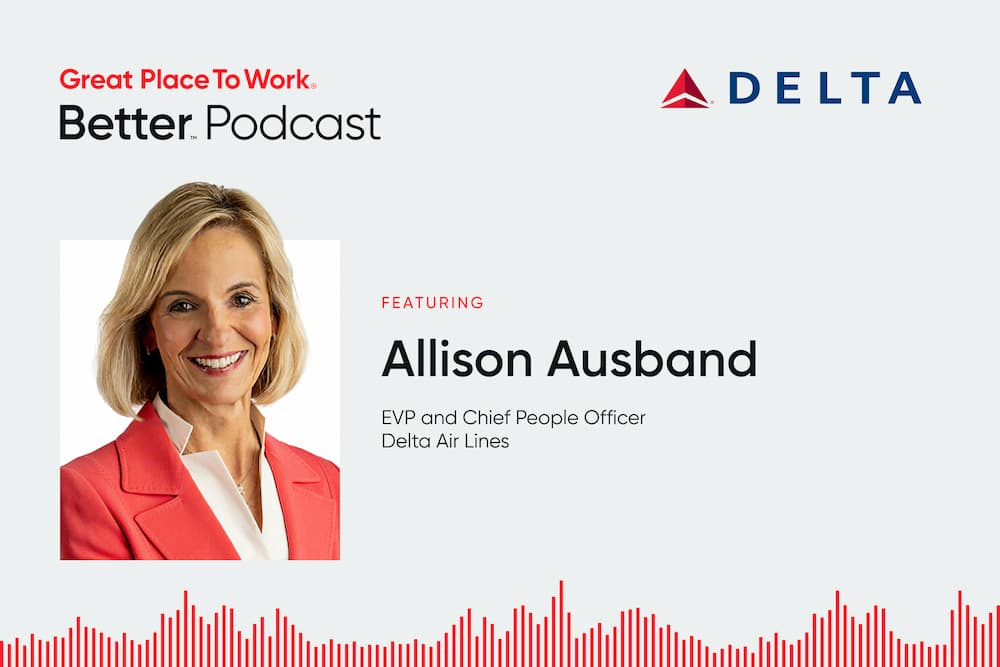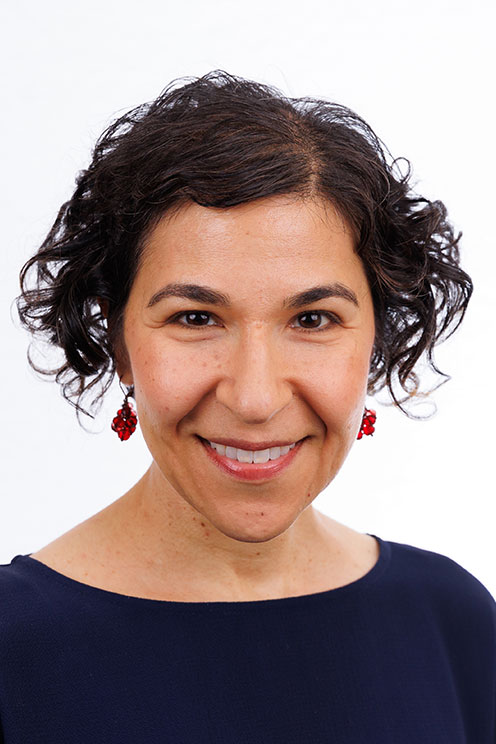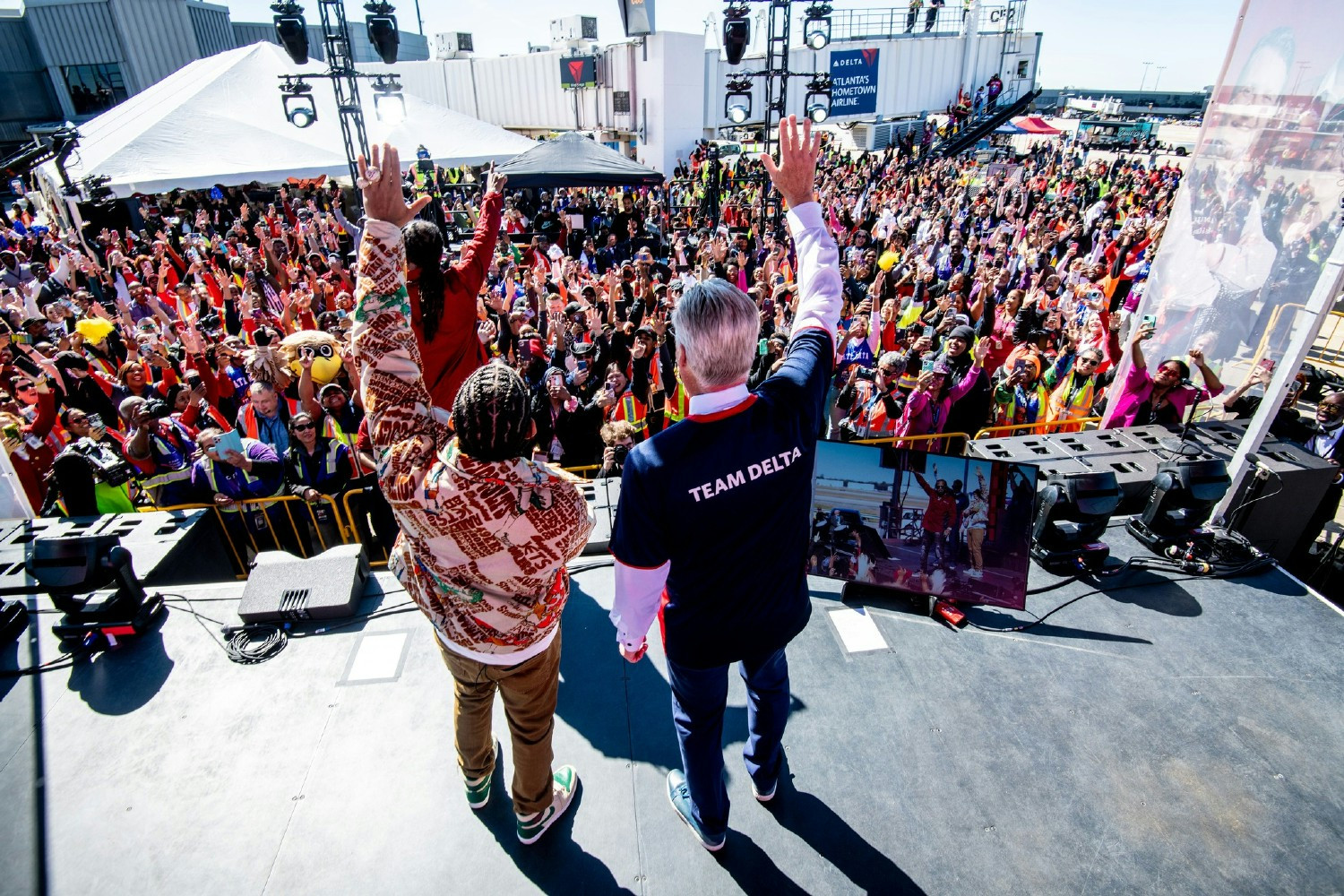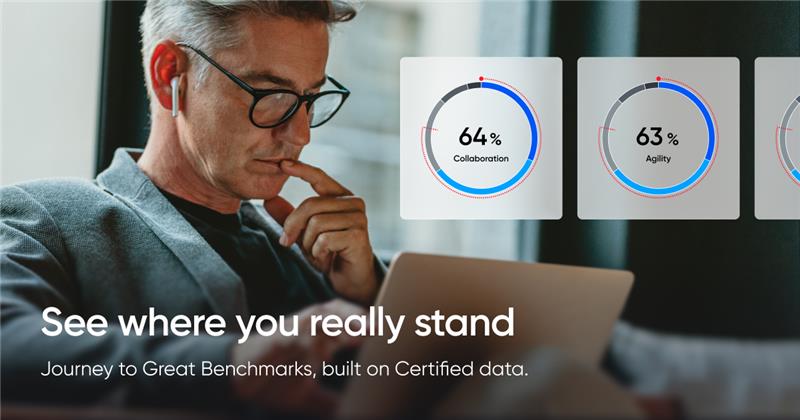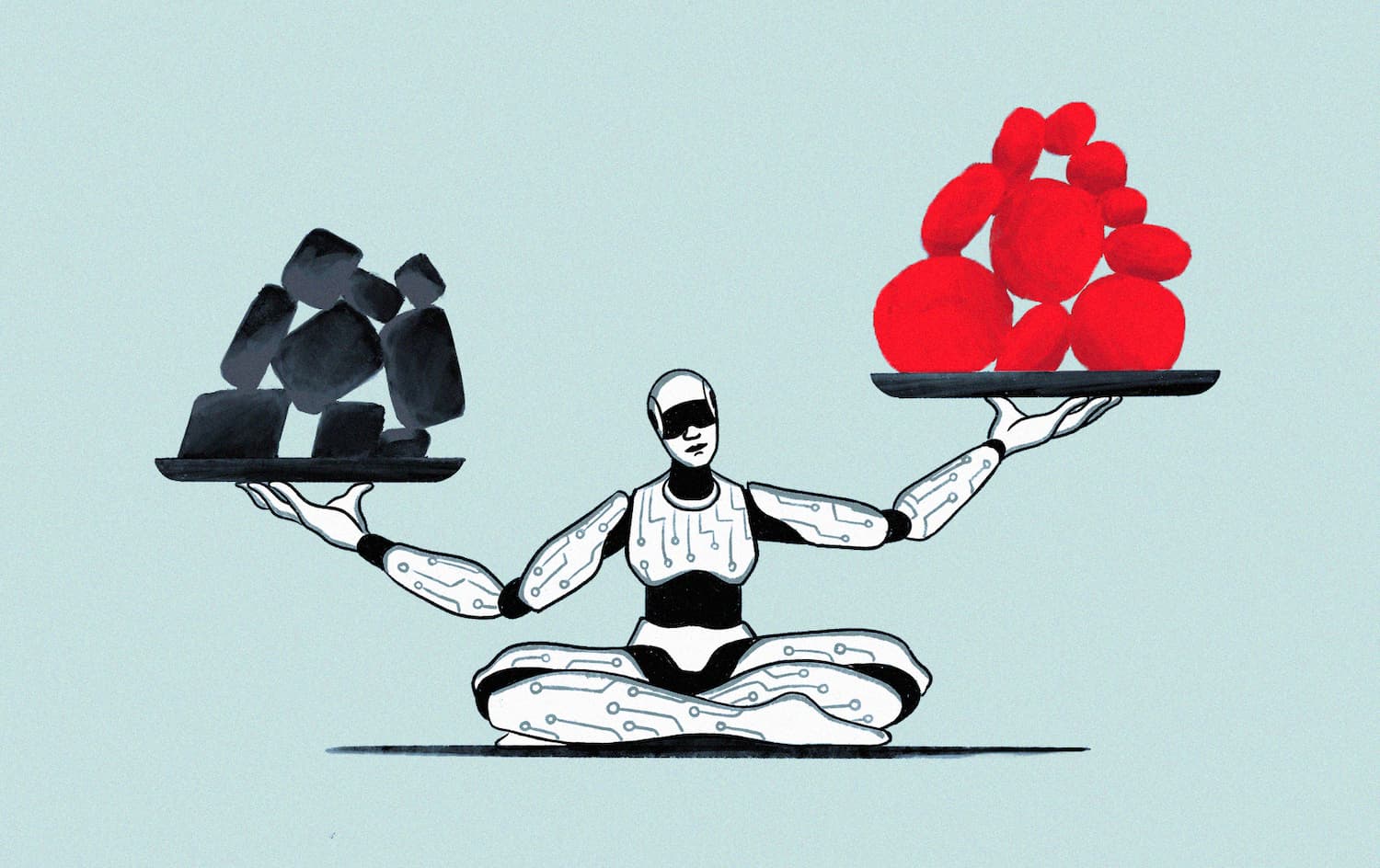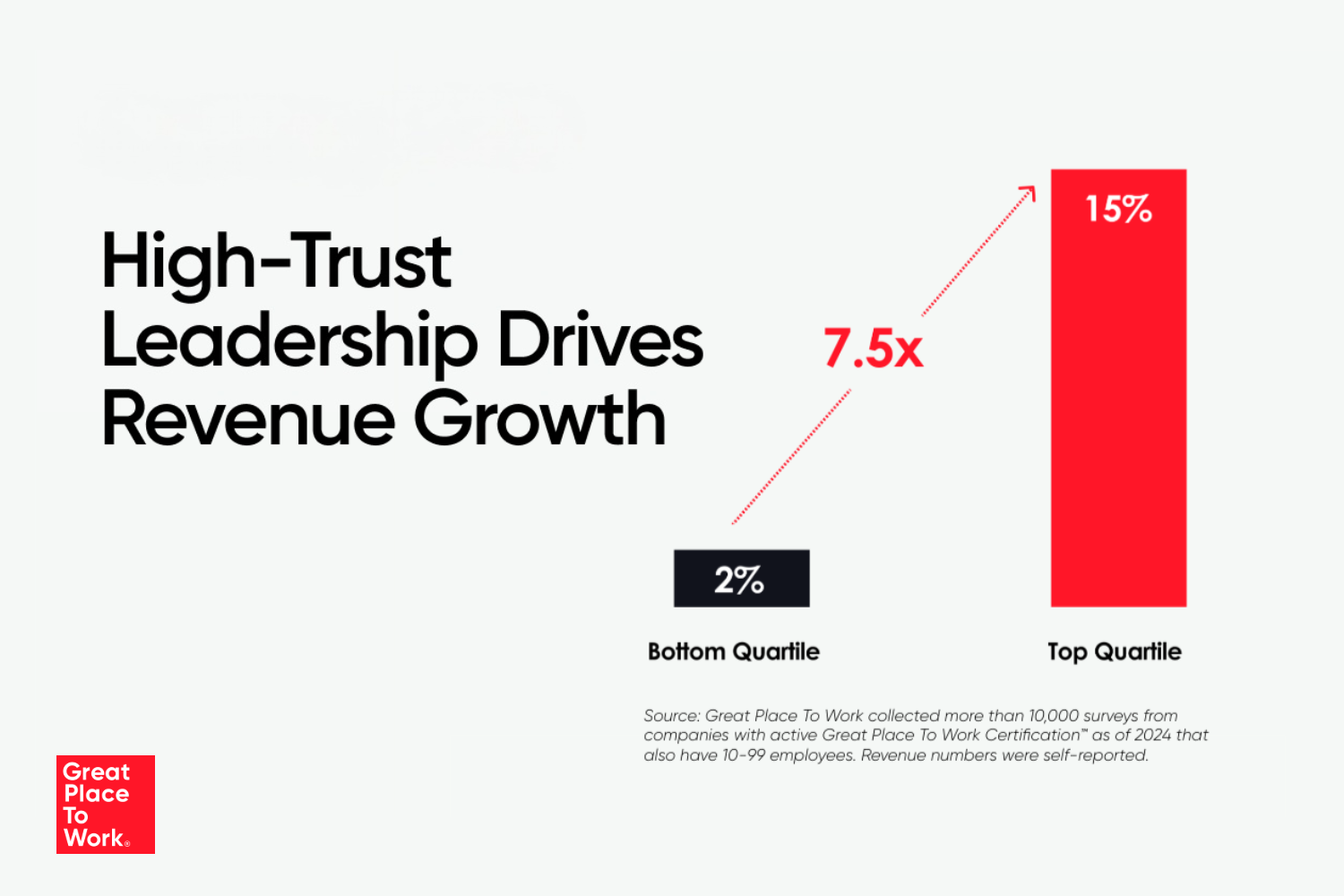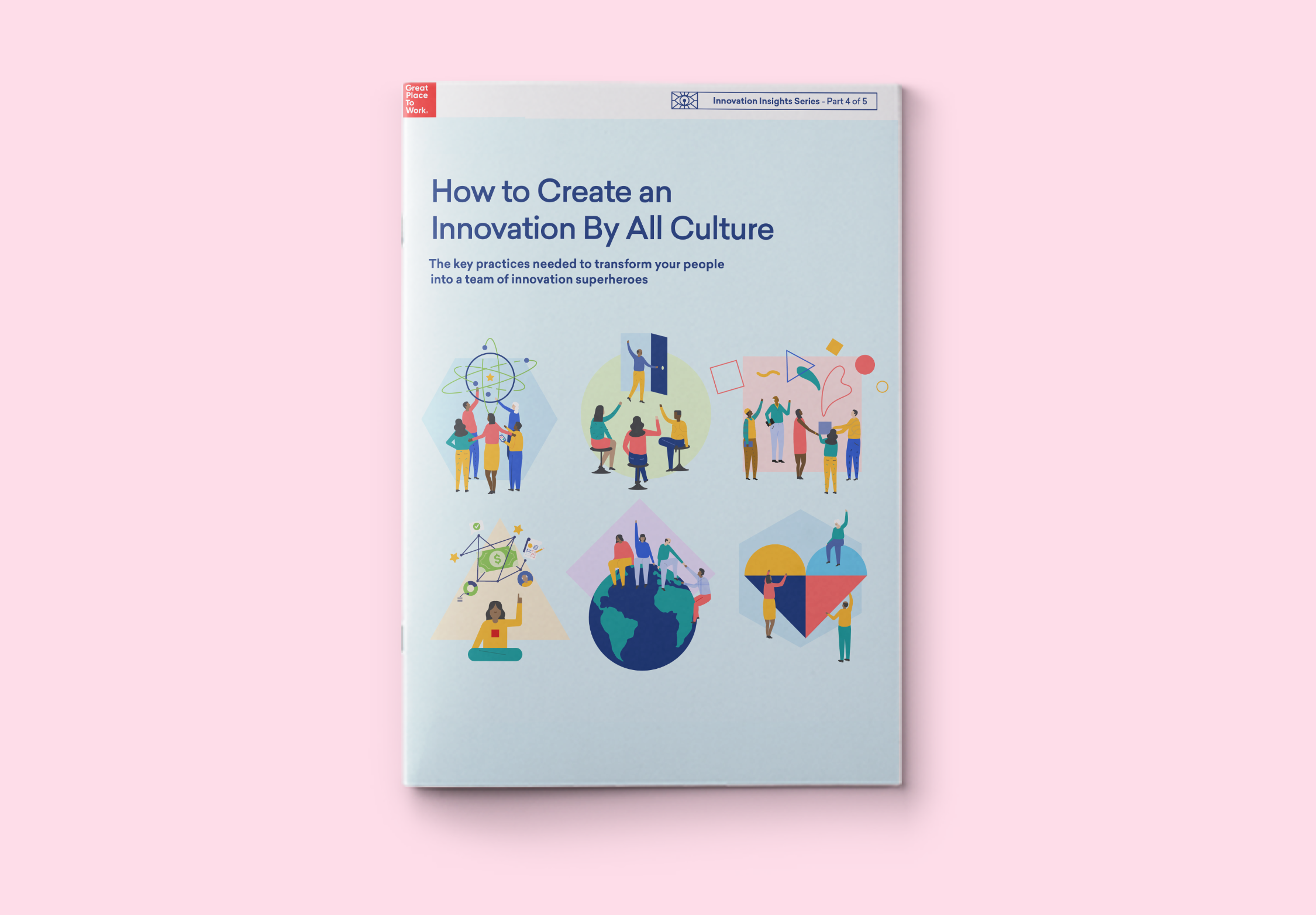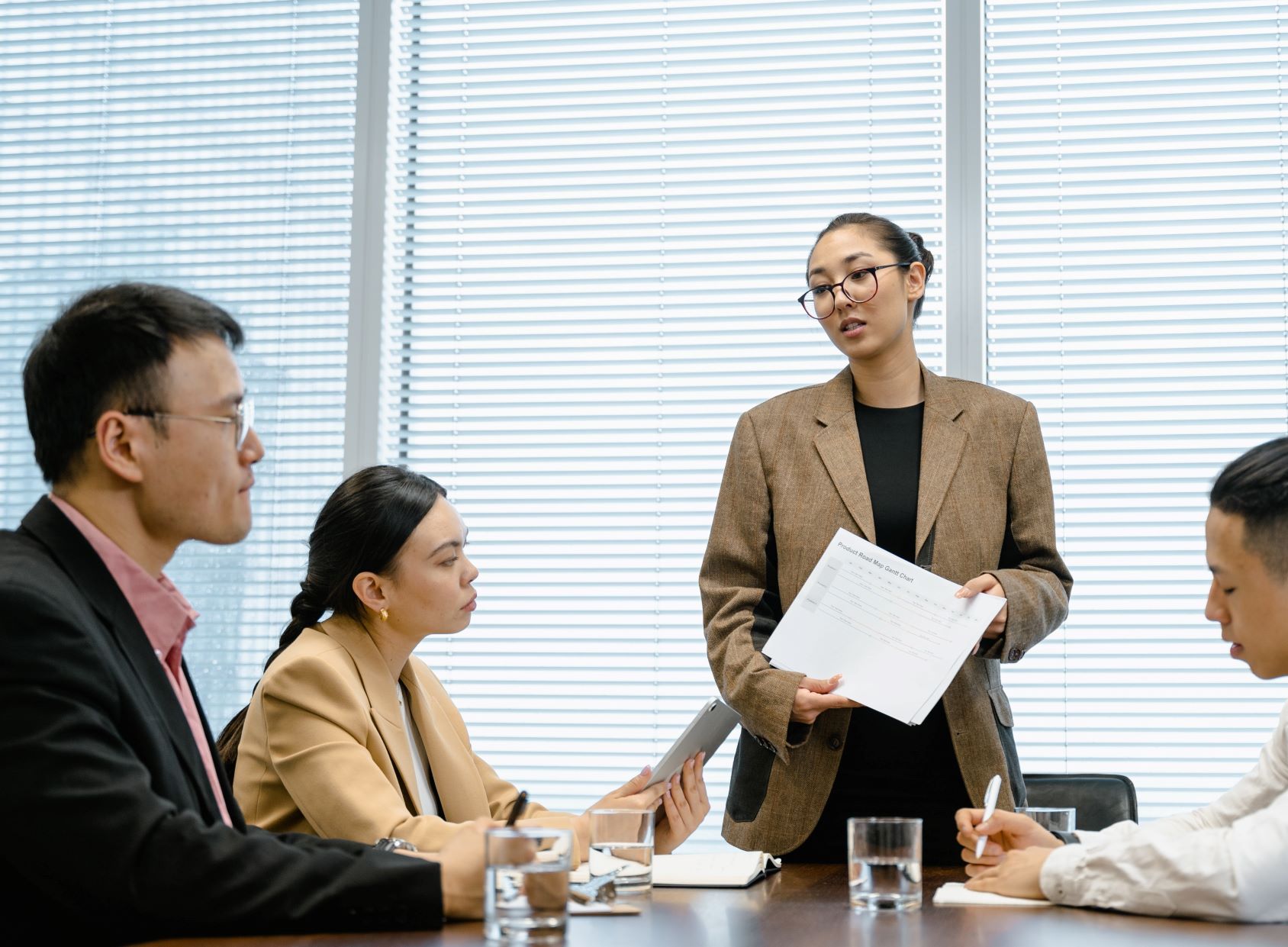Company Culture, Leadership & Management
Allison Ausband, EVP and chief people officer at Delta Air Lines, joined the Better podcast to share how Delta’s people-first culture has propelled the company’s success — including a dramatic leap from No. 94 to No. 15 on the Fortune 100 Best Companies to Work For® list in just one year.
Ausband began her career as a flight attendant and now leads the charge in creating a workplace where employees feel valued, heard, and supported. “If our people know they matter,” she says, “they’ll serve our customers extremely well — and that drives business success.”
On the 79-rank jump on Fortune from No. 94 to No. 15:
It’s people first, and it started 100 years ago. We've had nine CEOs and they all put people first in everything we do. When you put your people first, it's also about listening to them and then responding, and acting.
Our founder said, and I'll paraphrase, ‘We can all buy the same Airbus 350. We can buy the same snacks. We can buy the same airplane seat. But one thing that others can't replicate is the Delta people.’ If you ask our CEO Ed Bastian what his No. 1 job is, he says, ‘Take care of Delta people.’
On how Delta culture drives business success:
We firmly believe that if we put our people first, we are putting our customers first. We want to make sure that the 100,000 people at Delta know they matter. And if they know they matter, they are going to serve our customers extremely well. And if our customers keep coming back when we serve them really well, then our investors are going to get paid, and it comes back full circle.
We firmly believe that if we put our people first, we are putting our customers first.
On the importance of profit-sharing with employees ($1.4 billion in 2024):
Feb. 14 is the best day ever. Not because it's Valentine's Day, but because we get to go thank 100,000 people on profit sharing day. This is a day that we can all stop and say, ‘Thank you for what you've accomplished for Delta.’
We can't get anywhere without teamwork at Delta. We’ve got a huge frontline team and we've also got people at headquarters, and it takes all of us to get that customer in that seat. It's about teamwork and shared success. We’ve gotten to where we've gotten by working together, not by a single individual.
This profit-sharing program has been wildly successful. In the end, it's about industry leading total compensation for industry leading performance. That's our commitment to our people and one that we continue to live up to.On the ‘Behind the Wings’ program, where corporate workers see how frontline operations run:
One of our values at Delta is servant leadership. And to me, this is a great example of servant leadership where we empty out our headquarters and our executives really walk the walk of our frontline teams, stand beside them, roll up their sleeves, help check people in, and guide people at our airport.
It’s invaluable for us to see where we can help our frontline improve things. And at the same time, our frontline gets extra set of hands, which is fantastic.
On ‘Velvet’ listening sessions with frontline employees:
We’re in our 19th year, so this is something we've been committed to. We kicked them off in a deserted Macy's building in downtown Atlanta. It was called the Velvet Rope so our employees can see behind the rope. We have anywhere from 600-800 employees from every area of Delta. Our CEO and all our senior leaders participate in it; it’s something none of us miss, because we get as much out of it as we hope those that attend Velvet do.
It’s an opportunity to align around the mission and celebrate. We recently celebrated one of our employees who donated a kidney to a customer, saved the customer's life and actually saved her life because she found out she had issues. We celebrate major milestones, service anniversaries, 50-year employees, etc. It's an opportunity to recognize and celebrate, and at the same time, hear what they need, what's working well, and what isn't working well for them every day.
Roula (00:29):
Allison Ausband, EVP and Chief People Officer at Delta is on today. She started her career as a flight attendant and now leads Delta's people first culture. She shares how that approach has significantly impacted their business. Their leap from number 94 to 15 on the Fortune 100 best companies to work for list in just a year is a testament to their success. What I loved about this episode is that any company can replicate many of the programs we talked about. And if you're thinking we're not Delta, we can't do this, listen in. When I ask Allison that very question and I can't stop thinking about the story she told me of the Delta employee who donated a kidney to a customer, it's a story you won't want to mishearing. Tune in and enjoy.
(01:21):
Alison, welcome to the podcast. Thank you. Delta has been on my podcast wishlist, so I am so happy to have you on. I'm going to take us back to my Ohio days. When I became a Delta fan, I lived in Cleveland before moving to Chicago and I would fly a lot for my job. And the two, I always say this, the two things I miss about Cleveland is the Delta hub, which is not in Chicago and the west side market. So if you're in a clevelander, you know what I'm talking about. But for many years being in Chicago, I chose to fly Delta with connections.
Allison (01:53):
I was going to say, and that was a little bit of a sacrifice to do that.
Roula (01:56):
Being
Allison (01:56):
In Chicago.
Roula (01:57):
Yes. But I did it over a direct flight on another airline. Thank
Allison (02:01):
You, thank you, thank you.
Roula (02:02):
And now not going behind the scenes. But now in my role, I can see why I had such a great experience because the employees are having a great experience and just the service, just everything from soup to nuts was always super enjoyable. So we'll get into what you're doing there. I'm going to start off with some congratulations. Delta went from number 94 on the Fortune a hundred best companies to work for list in 2024 to number 15 this year, which is a 79 rank jump. That's among the highest jumps we've ever seen, and it's very impressive. Well,
Allison (02:39):
We are super, super excited. The Delta team is elated and I get to share it every week at Delta. So in front of 500 employees and they're cheering. They're so proud. And we have to keep climbing though. Is there
Roula (02:52):
Any insight you'd share on why you think the significant jump in rank, what you cheer with your peers?
Allison (02:59):
Yeah, I mean, I would say it's people first, and it started a hundred years ago. We're a hundred years old this year, which we're super excited about that as a Delta team. And we've had non CEOs and every single one of them have nurtured, putting people first and everything we do. And I think along with that, when you put your people first, it's also about listening to them and then responding, right, and acting. So we say from the very beginning, our founder said, and I'll paraphrase, he said, we can all buy the same Airbus through three 50. We can buy the same snacks, we can buy the same airplane seat. But one thing that others can't replicate is the Delta people. That was day one and our CEO Ed Baston believes it today and pours in, if you ask him what his number one job is, he says, take care of Delta people.
Roula (03:54):
So I didn't hear you say anything about Pelotons or free food or perks as the reason employees are having this positive employee experience. So let's talk about some of the reasons as you've alluded to this virtuous circle that we see between business performance and a positive employee experience. And it's intuitive, but it tends to get lost. And what we mean by that is if you care for your employees, they'll care for you. If you treat them like they matter and their work is meaningful, they'll work hard for you and they'll want to stay working hard for you. You get back what you about.
Allison (04:30):
That's right.
Roula (04:31):
And we see this in the data, so I'd love to hear you talk about the ripple effect people first
Allison (04:37):
Cultures have. velet believe that if we put our people first, we are putting our customers first because, and if you think about what we do at Delta every day, we never stop 365 24 7, you've got a team on the ramp, it's minus 12, and they're loading bags in minus 12 or rainy weather, 200 million customers a year. It's hard what we do, but the opportunity we get is to carry humanity, but it's hard work. So we want to make sure that a hundred thousand people at Delta know they matter. And if they know they matter, then they are going to serve our customers extremely well. If our customers keep coming back when we serve them really well, then our investors are going to get paid and it comes back full circle. So we're a firm believer if we pour into them, then we are absolutely taking care of our customers in that process.
(05:30):
And I think it goes back to listening to what they need every day, the tools they need, right, to get through that tough weather, putting automation in their hands to make their jobs easier. That's the day-to-day. Also, on the wellbeing side and the financial side of things and our employees, we initiated an emergency savings program where financial literacy for our frontline folks, or really for all people where you can go and get some financial literacy and at the same time you get a thousand dollars for an emergency savings plan. Some of our population having trouble with infertility, and we said, okay, let's look into that. And we've had 200 new Delta babies as a result of our fertility program. And you think about that, that's wellbeing. If one of our employees or a segment of our employees are struggling with having a family, they don't leave that at home when they come to work, that's still on their hearts and minds. So an opportunity to listen to that segment of the population and pour into it. So just a few examples of that. Let's
Roula (06:35):
Talk about fair pay and profits. According to our research, if people feel they receive a fair share of profits, they are 180% more likely to feel that their work has meaning and 130% more likely to give extra agility and retention are also higher if people feel that they receive a fair share of the profit. So it matters. Your profit sharing is incredible. It is unmatched. I'll let the numbers speak for themselves. You have a profit sharing program that began in 20,008 as you're emerging from bankruptcy, I
Allison (07:07):
Believe. That's right.
Roula (07:08):
We're all eligible employees get a portion of the profits. To this day in 2024, you paid 1.4 billion billion with a B in profit sharing. It happens every Valentine's Day known as profit sharing day at Delta. How does all of that help your bottom line? How does sharing the wealth actually increase your wealth?
Allison (07:30):
Yeah, first of all, February 14th is the best day ever. Not because it's Valentine's, but because we get to go thank a hundred thousand Delta people and we go out around the world and just celebrate and everybody is, it's an opportunity to stop because you think about we are moving all day long again, 24 7, our people, their heads are down to serve the world. We never stop. And so this is a day that we can all stop and say, just thank you, thank you for what you've accomplished for Delta. And we are a high performing culture. We want to win in the most humble of ways, and we can't get anywhere without teamwork at Delta. And so we all right, quite literally, we've got a huge frontline team and we've also got people at headquarters, but it takes all of us to get that customer in that seat.
(08:26):
And so for us, it's about that teamwork and shared success. And velvet believe that we've gotten to where we've gotten and being number one and on time, separating ourselves on the customer experience side. We get there by working together, not by a single individual. And so this profit sharing program has been wildly successful again, and in the end, it's about industry leading total compensation for industry leading performance. And that's our commitment to our people and one that we continue to live up to. Back to that shared success, you pour into Delta every day. You drive these phenomenal results. This February 14th, it was 1.4 billion. So again, just it's a great day to say thank you
Roula (09:16):
For people listening who might be thinking, we're not Delta, we can't afford this. What would you say? What would you say to them? What can they do?
Allison (09:24):
Yeah, I think there are all kinds of ways to recognize that collective success. And I would find out, yes, just pay motivate all of us, but there are so many other ways to motivate. And I would listen to your people at some of your smaller organizations outside of pay, what matters most to them, and then go structure a program that drives everybody to that common vision and success point. And just double clicking on the fact that this started as you emerged from bankruptcy. That's right. Which was a super incredibly dark time for Delta. I've been with Delta a long time, and I will never forget. I thought the lights are going to, I was in Dallas, Fort Worth at our A call center. I thought the lights are going to shut off. It was a huge time where our pride, it was just nobody ever wanted to see Delta at that customers. And then I believe bad things happen, but great things come out of bad times. And just to see where we've been able, again, collectively as a Delta team, take it from there. With profit sharing being one of those, it was like, this is a dark time, but you all, we can come back and here's this profit sharing program. When we do come back, this is what it will mean to all of us as a Delta team. So did you have any type of profit sharing before that time? No. Okay. No.
Roula (10:45):
Okay.
Allison (10:45):
But honestly, always industry leading pay from
Roula (10:50):
Okay. From the start. Yeah, from the start.
Allison (10:52):
Yeah.
Roula (10:53):
In 2023, you started a Behind the Wings program, which is where corporate workers see how frontline operations run. So that might mean a pilot works in baggage claim for an example. So it's an immersion program. You started at Delta as a flight attendant. Yes. And you've had many different roles, reservation sales and flight service, of course, your role now. So you've done this program growing in your career at Delta. Why is this so important to do? Why did it start and any lessons for others if they want to do something similar?
Allison (11:27):
I would say, first of all, your frontline teams, ours, particularly at Delta, but really in any company, they make it happen for you every day. They're the ones closest to the customer. And so for me, if I had to start my career all over again, I would start it right where I started. Because you know what it's like to be out there among customers from around the world. One of our values at Delta is servant leadership. And to me, this is a great example of servant leadership where we will empty out our headquarters and they go participate in behind the wings to really walk the walk of our frontline teams, stand beside them, roll up their sleeves, help check people in and guide people at our airport. And it's great because our people at our headquarters who may be in revenue management but aren't out there every day to see how the kiosk works to check in a customer, they're out learning that aspect of the job. They're seeing where we may have opportunities to be better to support the frontline, and then our frontline has an extra set of hands when our airports are so crowded. So it's invaluable all the way around for those of us who aren't out there every day to get a dose of reality,
(12:48):
To see where we can help our frontline improve things. And at the same time, our frontline gets extra set of hands, which is fantastic. Is it a shift or how does
Roula (12:59):
Work? It's
Allison (12:59):
A shift. We can all sign up and really, we have an ask of all of our officers and directors at Delta that they all participate at least two times a year. So making sure they're out there at least two times a year. And then really for everybody, it's meaningful to everybody who does it. And for those of us who aren't out there every day, you go out and you get to talk to the customers and you come back and you feel like you contributed today because I was out there with the crowd and with the masses and being able to help a lending hands
Roula (13:33):
And show, don't tell. We're not just telling you. We're showing you.
Allison (13:36):
That's right.
Roula (13:37):
Is there an example of something someone on your team has learned by through this program or come back with a new idea, tweaking a program or generally speaking learnings that have come out of
Allison (13:50):
Doing this? Yeah. I would say two things. One, which our frontline team was struggling in our kiosk with passport readers, for example, the kiosk reading passports. And one of our team members was out there participating in Behind the wings and really sat down and determined, okay, this is the issue. This is what's going on. Let's fix it. Went back to fix it. Another one was at our need help centers and our concourses at the airport, the lines were long and they said, why don't we do virtual queuing? Why don't we create a QR code virtual queuing so the customers don't have to wait in line for 20 minutes, they can go grab a Starbucks and we'll ping them when they can come back and get help. So those are two immediate that have made a difference, made a difference for our people, but more importantly, made a difference for the
Roula (14:40):
Customer. And any tips for others listening to this and wanting to emulate it, who say, we can't have headquarters just take shifts and be gone? Okay. Yeah. But okay. Obviously you can. Are there any learnings that you might share? Things that did or didn't work in rolling out a program like this?
Allison (15:00):
Yes. It wasn't always as sophisticated as it has been. So it's evolved over time, but I would say what everybody gets out of it pays back threefold. Even if you can't spare six hours, do three hours, do an hour, but at least you're out there with your product and your customers and your people, and you have a better sense of what goes on every day. And for us, what we learned, for example, and this was just a year and a half ago, we said we need to offer some training, like a mini briefing and training session for everybody going out. We used to just deploy and they'd show up at the airport in a room and we'd, okay, you go work ticket counter, you go here. And we had such overwhelming response for people to go do it. We said, we need training. So we instituted some training. It's online training. People can take it at their desk really, really quick. Then they show up at the airport, and we actually have assigned someone at our airports that's the ambassador for the behind the wings, and they're there to kind of help them walk through again, okay, you're going to go do this today. Let me give you a quick briefing. So I would say some training. We did a quick application so they could sign up for it
(16:17):
And made it easy, made it easy. So those would be a couple of tips that I would offer up.
Roula (16:22):
Yep. You have an internal event called Velvet, which you do, I think about 12 times a year. 15 times 15, 15.
Allison (16:29):
If it were ed, we'd be doing it. If ED could increase it, we would.
Roula (16:33):
And so they are listening sessions where you bring frontline employees together and take them behind the velvet rope so they really understand what's going on in the business or understand it from that perspective. This again started during the time you filed for bankruptcy, and that's ongoing today. Why are these, I mean, we've talked about listening, but why are these, now you're doing 15 a year, why is it so important and what comes out of that? Is there any tangible, are innovation is now higher, we have X new ideas or anything that comes out of it? Or is it just the shared understanding of connecting your job to the business return?
Allison (17:10):
Yeah, it did start, we're in our 19th year, so this is something that we've been committed to for 19 years. It was a dark time when it happened, Delta, we didn't know what was going to happen to Delta when we first kicked them off. We kicked 'em off in an old Macy's building, deserted Macy's building in downtown Atlanta. It was called the Velvet Rope. Let me put you bring our employees. So you can see behind the rope, we have anywhere from 600 to 800 employees from every single area of Delta coming together again for the last 19 years. It is from and from the very beginning, our CEO, all of our senior leaders participate in it. They don't miss, it's something none of us miss, because honestly, as leaders, we get as much out of it as we hope those that attend Velvet do. So it's an opportunity to just align around the mission. Here's where we are currently at Delta, reminding them of our superpowers from our people to our network, to our customer experience, to our reliability, safety, and reinforcing those messages align on the mission, celebrate every single velvet we celebrate. This past week, we celebrated one of our employees who donated a kidney to a customer,
Allison (18:32):
Saved
Allison (18:32):
The customer's life and actually saved her life because she found out she had issues. So we celebrate that. We celebrate major milestones, service anniversaries, 50 year employees, but it's an opportunity in front of their peers to just represent, this is what the Delta team does.
Allison (18:50):
So
Allison (18:50):
It's an opportunity to recognize and celebrate and then at the same time, hear from them what they need, what's working well for them every day, and what isn't working well for them every day. So I have to ask you
Roula (19:03):
About the employee who donated a kidney to a customer. How does something like that happen? How did they even know? Customer needed a kidney
Allison (19:12):
Small station, and she worked in baggage claim,
(19:17):
And this is one of our diamond customers would just go in and say hello to them because you're probably familiar with our smaller stations. And she walked in one day and this customer was standing there and talking about he was sick and that he needed a kidney, and none of his family weren't a match. So she went home and talked to her family and said, I know this customer. We talk all the time when he's in and out of the airport. Are y'all okay if I go get tested? So that's what happened next, got tested and her family was a little, but I get emotional thinking about it, but we say this all the time, it's the delta difference that is an over the top example of the Delta difference.
Allison (20:04):
And
Allison (20:04):
You think about the recovery period for her, but then just the full circle moment of saving his life and then finding out she had some issues when they went in to take the kidney and it helped her too. So it's an amazing story. There are stories like that every day.
Roula (20:21):
That's just one of
Allison (20:23):
Exactly. We had one a couple of weeks ago, this mother was traveling internationally and she was connecting through Detroit, I think, and she didn't have any diapers. So the flight attendant left and went to Target and got diapers for and brought her back to the airport. That's just not easy leaving the airport, coming back, but I mean, it's every, and she
Roula (20:44):
Got back in time
Allison (20:45):
For the woman's flight. She, yeah, she had a hour layover before she connected. And who does, I mean, those are things, right, that we are so protective. When you think about culture and you think about great places to work and you think about it is the people and some of that you can teach, but you can't. It's in who you hire and their work ethic
Roula (21:09):
And who you hire, but also how you inspire.
Allison (21:12):
Yeah,
Roula (21:13):
That's right. They're inspired to go above and beyond because of that virtuous cycle of care. That's
Allison (21:17):
Right.
Roula (21:18):
You're pouring all that in the share profits and all the different things. So they're going to want to go the extra mile. Hey everyone, if you like listening to the podcast, then don't miss the Great Place to work for All Summit in April in Las Vegas where you will learn from the best in the world, meet more than 1500 leaders and get insights on what the data says drives business success. And that is people and culture. I promise you. Leave inspired and ready to transform your workplace. Use the code better to save 20% off registration link and coder in the bio. Don't miss out and I'll see you there. Did you always want to be a flight attendant? No work in the
Allison (22:12):
Airline, or was this just happenstance? I majored in journalism in school. Same here. So I was a radio announcer when I first got out of school, but I grew up in Atlanta, so I wanted to work for a company that I admired their values and their work, the brand and Atlanta, it was Delta and Coke. So I had friends at Delta, applied at Delta, got turned down because at the time I started and I applied to be in public relations, but at the time I started, everything was promote from within. So our CEOs, for example, started on the ramp and worked their way up. And so I said, damn it, I'm going to work for Delta. I'm going to reapply. Matter of fact, I have my no letter hanging on my wall in my office just to inspiration. But I'd flown a couple of times and they said, you can start. You can clean airplanes, you can be reservations, you can be a flight attendant, a pilot. I said, okay, I'll go try to be a flight attendant, a pilot to be a flight attendant. And so that was my entry in, and if I had to do it all over again, I would start all right there. Your runway is 17 and a half inches wide on board that airplane and just the people you get to meet and just humanity coming together on an airplane. There's nothing like it. So you didn't
Roula (23:35):
Make it down the hall to pr?
Allison (23:37):
No. And
Roula (23:38):
We're all so thankful for that,
Allison (23:40):
But I feel like I use it every, I mean the communication. We have a lot of Delta people and we want them to want to make sure that we're communicating in the best way possible, transparency and all those things to motivate 'em to go be that delta difference.
Roula (23:57):
And you're doing it right now.
Allison (23:58):
Yeah. You
Roula (23:59):
And I. What advice would you go back and give your younger self?
Allison (24:04):
Take more risk.
Roula (24:05):
Take
Allison (24:05):
More risk. Okay. Take more risk. I'm a little bit of a perfectionist, which is not good. And so taking risk is, it's a little bit harder for me, but more I've progressed through my career. I just look back and I think, gosh, I could have raised my hand a little more. So it's one thing that I try to share to others. Raise your hand and take more risk.
Roula (24:31):
Is there a hobby, passion project that you have that gives you energy or something that's on your list of want to learn or do
Allison (24:41):
At all? One of my passions is fighting human trafficking for Delta. So I lead those efforts for Delta. It's in the top three illegal industries, 150 billion of illegal revenue. And what attracted me to Delta to begin with is just giving back to the community that Delta serves. And this is one way that we can do it. When you interview survivors, they say that 70% of them will say when they were recruited, they flew in an airplane.
(25:14):
So you think about 200 million customers, a hundred thousand employees who get to travel and are all over the world and on their layovers or on their trips. And so the opportunity to play a part in training the Delta team to look for the signs wherever they are in the world. And my favorite aspect of that is we offer internships to survivors. As a matter of fact, one that we have right now, it's been an extended internship. She's been with us for about a year and a half, but she's starting to get her pilot's license. And so that is something that Delta can do. That's one of my passions, one of my big passions. But it's an honor to be able to serve in that way. And for Delta to be able to play a small part in somebody's life and getting their life back significant, giving them a life back. That's right, actually. That's right.
Roula (26:05):
Is there a book or podcast you would recommend to your peers?
Allison (26:09):
I am rereading. It's your ship. It's by a Navy captain, and to me it's all about servant leadership. And he was commander of a ship that was one of the poorest performing in the Navy, and he got assigned that ship and how he took it and turned that into a huge success through his leadership and communicating and empowering people to do what they had to do, even though it might be hard every day. So that's currently what I'm rereading. I would recommend it to anybody. It's great leadership book. Sounds like a great recommendation.
Roula (26:47):
Well, Alison, thanks for joining today. You were a terrific guest and I really enjoyed our conversation.
Allison (26:53):
Thank you so much for having us.
Roula (26:56):
Thanks for listening. If you enjoyed today's podcast, please leave a five star rating, write a review, and subscribe so you don't miss an episode. You can stream this in previous episodes wherever podcasts are available.
Get recognized for your culture
Gain accolades for your workplace environment and attract top talent who share your values.


